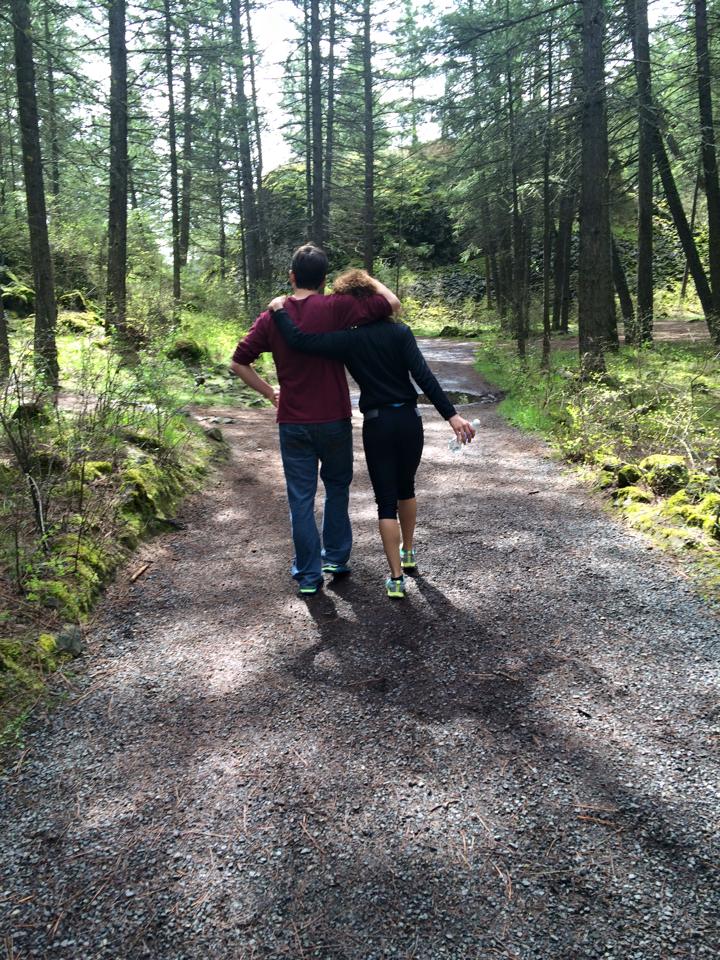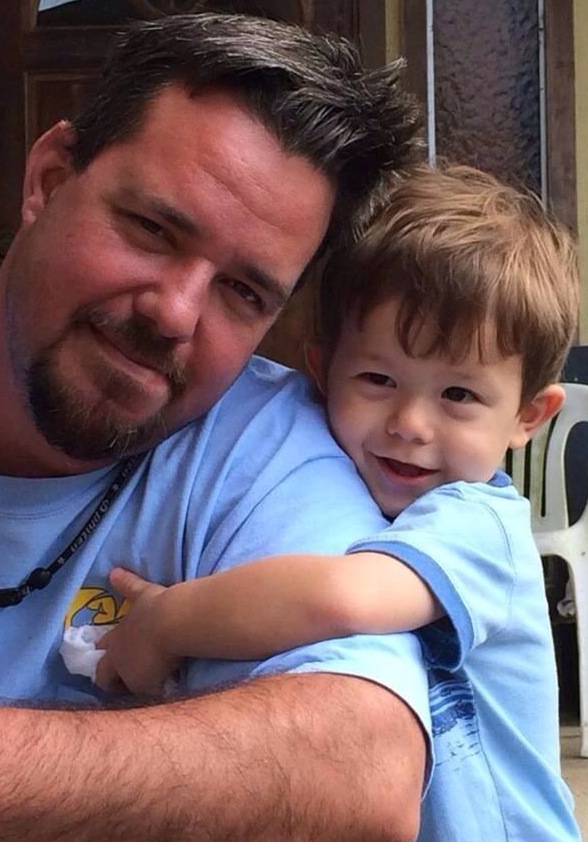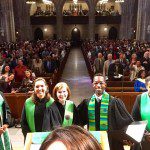In April 2015 I gave the closing address at Faith Forward in Chicago. It ended up being some deeply personal reflections on the loss of my brother, John, only one year before. Yesterday would have been John’s 40th birthday, and even with the passing of time occasionally the grief is so sharp it makes you hold your breath. So I’m reposting today in honor and memory of my brother, John. Rest in peace and rise in glory.
I’m curious to know how many of you came to Faith Forward in DC in 2012? That was the first year of this conference, as you recall, and it was held at the church I then served, Calvary Baptist. Last year and again this year, it has been a joy to return to a place filled with light and life and optimism and hope; to hear the kinds of amazing things you all are doing in your work; to think creatively about our future—to look forward, you might say.
That’s really at the heart of our work, isn’t it, as we follow a God who is ever-creating and most of the time we’re doing the best we can to keep up, right?
And looking forward has certainly been a theme of my year. In fact, last year in Nashville at Faith Forward I was just toward the end of a pretty grueling vocational discernment process in conversation with The Riverside Church in the city of New York.
As I’ve learned since I began that discernment process, The Riverside Church has an incredible legacy of prophetic voice and cutting edge ministry; it’s an extra-denominational Christian experiment; it’s a place that in its history has led the way for radical expressions of Christianity on many fronts.
I couldn’t at that time last year have any idea of how my life would change in this year gone by, (and that’s probably another talk, or a three volume tell-all memoir or something like that) but what had begun for me in that process of discernment and has continued throughout this year: a relentless push to find answers to the question of where the church is going; a persistent offer to speak to the desperation many in the institutional church are feeling right now; and then the invitation to take on leadership of what some might say is among the most formidable congregations in American Protestantism today, The Riverside Church—kind of the “on the ground” expression of the big questions we’re all asking.
So, while I along with everybody else, have been asking theoretical questions about the future of the church, my real life intersected those questions in a big way this past year when, shortly after Faith Forward last year, The Riverside Church voted to call me as their senior minister.
And so, the ball started rolling. I said goodbye to a congregation I had loved for 11 years. I packed up and moved to New York City, while my two youngest, older teenagers, stayed in DC to finish up their final years of high school. I began the work of learning a new congregation, city, set of responsibilities…all looking forward, forward, forward…to whatever is next, to the dream of the future, to all the possibilities God might create in this wonderful work.
And I’d been doing all of this, going at this pace, thrilled by the challenge of the work and the wild ride that this has been, trying desperately to juggle all the changes in my family’s life and to learn all the new things I had to learn. And a few weeks ago I found myself, as part of this journey, traveling to Spokane, Washington to deliver a lecture.
It was Spring Break for my kids, Hannah and Sam, so I thought it would be fun to take them with me, to have some family time and all of that. So, we packed up and headed out West. I worked the whole flight out to Washington, and was busy explaining to the kids all the obligations I had that week and when I thought we might fit in some leisure time. I was so busy and preoccupied that the first day there my phone slipped out of my hand, somehow, fell facedown on the cement sidewalk, and completely shattered.
I don’t know if you feel the kind of dread in my description of these events that I felt when that happened, but there it was: in one fateful second my constant connection to all that was “important” was ripped away from me. And, as it turns out, Spokane, Washington is a bit of a small town. They have an Apple store, thanks be to God, but for some reason still unknown to me, the fine folks at the store couldn’t replace my phone—they had to order it. And it would take three days.
THREE DAYS??! This is the United States of America, people!
 So I struggled through. The kids came along to my speaking gig, simultaneously baffled that anyone would voluntarily show up to hear me say anything, and also desperately bored out of their minds. Hannah, my almost-18 year old, graciously offered me the use of her phone so my colleagues could reach me, and I was using it the very next morning when we were at Riverside State Park walking along the Spokane River in one of the most beautiful natural settings I’ve been in in a long time. I opened the camera app on her phone and took a picture of my kids, walking ahead of me, and it was in that moment that I suddenly came to myself.
So I struggled through. The kids came along to my speaking gig, simultaneously baffled that anyone would voluntarily show up to hear me say anything, and also desperately bored out of their minds. Hannah, my almost-18 year old, graciously offered me the use of her phone so my colleagues could reach me, and I was using it the very next morning when we were at Riverside State Park walking along the Spokane River in one of the most beautiful natural settings I’ve been in in a long time. I opened the camera app on her phone and took a picture of my kids, walking ahead of me, and it was in that moment that I suddenly came to myself.
Okay, maybe it wasn’t that biblical.
But I looked at that scene, the one you’re seeing now, and I thought: that, right there, is what matters the most right now. Those two young lives that are, in this moment, right here in my very presence. Two lives about to launch into independence and a new kind of relationship with me—adult to adult—are here, with each other and with me in this beautiful, amazing place.
And I need to be here, right here, with them, now.
I put the phone away.
When I thought about that experience I had a few weeks ago, I kept returning again and again to the book of Ecclesiastes, that part of our holy text that nobody ever hears or reads unless they’re diehard Pete Seeger fans. The book of Ecclesiastes is a bit difficult to get our minds around, not that fun for biblical historical scholars because nobody really knows who wrote it, when it was written, or why. Further, it’s full of all of these deep-sounding statements that reflect a depth of wisdom we don’t often live, as we skate through our lives on the surface.
Here in chapter 11, the writer of Ecclesiastes muses about the value of just what I felt in that moment, something I’d venture to say all of us grapple with, and especially those of us who are persistently struggling to birth a future we cannot fully see. The sage of Ecclesiastes seems to be speaking directly to me, uh, us, when he says: “As you do not know the path of the wind, or how the body is formed in a mother’s womb, so you cannot understand the work of God, the maker of all things…. Sow your seed in the morning, and at the evening let your hands not be idle, for you do not know which will succeed, whether this or that, or whether both will do equally well.”
Here. Be right here. In this moment, for this very time. Look deeply into the eyes of the person right in front of you. Feel the brush of another hand on yours. Savor the hug of a friend. Listen with your whole self, open to be changed by what you receive.
Be. Here. Now.
Those of us who work with youth and children, those of us who work within an institution with an unknown future, are constantly being challenged to look ahead—and it’s true, we are important actors in shaping a future for the church when we create environments where young disciples can wonder about the divine, where we can offer opportunities whereby they are shaped into people of faith who live lives, as Brian said, of justice, generosity, and action.
Our children and youth are becoming, as we all are as long as there is breath in our bodies. But those precious lives intersect our own right here, right now. And I think it may be right as we prepare to return to our communities of service, energized for what’s ahead, if we pause to savor the moments in front of us, to delight in the discoveries of our littlest ones, to honor their wisdom and leadership, to cherish this moment—this one right now—before it’s gone.
Some versions of this Ecclesiastes text start with a translation of verse one that reads: “Ship your grain upon the sea…”. There are others that read: “Send out your bread upon the waters…”. As I read the text, thinking about these moments that matter, I reflected again on the time that has passed since we were last together.
Last year on my way home from Faith Forward I was standing in line at the taxi cab stand at National  airport when my mother called my cell phone. I couldn’t understand her well with the noise of the traffic around me, but I heard enough to know that my younger brother, 38 years old, was in the hospital. They didn’t know what was wrong, but it seemed bad. Stay tuned.
airport when my mother called my cell phone. I couldn’t understand her well with the noise of the traffic around me, but I heard enough to know that my younger brother, 38 years old, was in the hospital. They didn’t know what was wrong, but it seemed bad. Stay tuned.
The next few weeks were a blur as I, along with my other siblings, flew to Hawaii to be with my parents and my brother and his family. Later that week we had to make the hard decision to remove my brother John from life support, plan a funeral, and say goodbye way, way too soon.
The months that followed my brother’s death, as I mentioned earlier, were filled with my personal transition to a new city and new job. The background narrative that not many knew was that my sister in law was struggling to parent four young children alone, and my other siblings were stepping up to help care for their children to give her some respite.
I, of course, couldn’t help in so many ways they were helping. I couldn’t change diapers and drive carpool and pack lunches; I was barely surviving my own transition, and all of us were trying to navigate the waves of grief that kept dunking us under at the most unexpected moments.
Late last fall my sister in law visited NY with my littlest nephew Grady. He looks so much like my brother John that for the weeks they were with me, every time I’d look at him my breath would catch and my throat would close and the tears would threaten. I wanted to fix things for him, for them, for all of us, so very much.
One fall afternoon I took Grady to Central Park for a walk, to feed the ducks. We packed the stroller with a picnic blanket and some stale bread and walked down to the lake in the middle of the park.
I didn’t know it then, but the ducks in Central Park are not very hungry. At least they weren’t last fall. I mean, we’d throw the bread out into the lake and they’d totally ignore it, like a passing nuisance or something. The bread would land on the surface of the water and just sink to the bottom.
I was furious.
Furious.
I had this one afternoon with my nephew, during which I’d wanted so much to show him how to feed the ducks, to soak in every little bit of my precious brother in this little person, to patch up the gaping hole of loss my nephew didn’t even know he was carrying, to make everything better.
But the ducks didn’t care and wouldn’t cooperate, and I felt defeated.
Until I felt a little hand on my cheek, my nephew snuggled up close on my lap, pointing out an airplane in the sky, trying out new words and taking in fascinating wonders all around him, secure in my arms in that moment, and just fine.
He didn’t care about the ducks; he couldn’t know the weight of the world around him. He just knew in that moment that he was safe and loved, and that from that place of security there were more discoveries than he could imagine all around him.
The ducks didn’t cooperate, and I can’t fix Grady’s future, a life without his Dad by his side.
But I could be there, right there, in that moment. And I could feel his hand on my cheek.
And I could witness his amazement.
And I could feel hope and possibility through my tears.
I’m pretty sure the writer of Ecclesiastes was not talking about feeding recalcitrant ducks in Central Park when he wrote “send out your bread upon the waters,” but maybe in that moment it became a metaphor for something he was surely trying to convey: this life is so precious. The moments we have with our children are moments of deep meaning, not just for the future we’re building, but for right now. Right this very minute.
In all our hope for what will be, in all our striving to make it so, we should never neglect precious, breath-taking moments of becoming that are happening all around us and, indeed, within each one of us.
As you go from this place ready to move forward, to take all you have heard and learned and seen, ready to put it into practice and change the world, I want to invite you when you get home (before you commence changing the world), to send out some bread on the waters.
Sit in the reality of what is now. Witness the young lives around you in all the wonder that they are in this moment. See your own life through the lens of God’s creative genius.
And give thanks.
For what a gift we have been given, these lives of ours.
Be here now.
Feel everything you can feel.
Witness the beauty all around you.
Send out your bread upon the water.
See God.
Amen.












